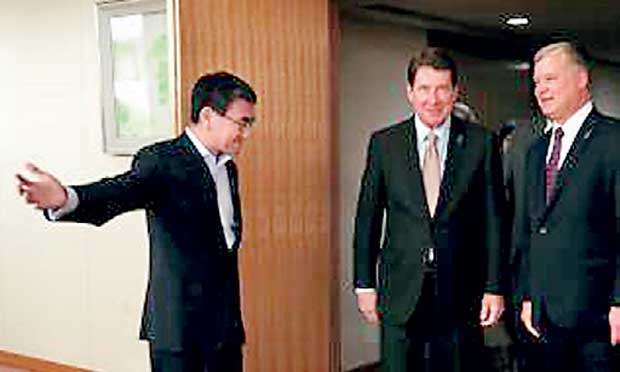17 Nov 2018 - {{hitsCtrl.values.hits}}

Japan's Foreign Minister Taro Kono, U.S. special representative for North Korea Stephen Biegun and U.S. ambassador to Japan William Hagerty attend their meeting in Tokyo on September 14
Reuters - “The United States is the most open major economy in the world,” Ambassador William Hagerty told reporters at the Japan National Press Club.
“Japan and other countries have benefited greatly from that openness. So I want to make sure that we don’t mistake our efforts to achieve reciprocity for protectionism.”
U.S. President Donald Trump has roiled Washington’s trade relations around the world notably with China as well as traditional allies in Europe and North America.
And he has voiced displeasure with Japan’s US$69 billion trade surplus with the United States in 2017 - almost two-thirds of that from auto exports - and wants a bilateral agreement to address it. Trump has asserted that Japans treats the United States unfairly by shipping millions of autos to North America while blocking imports of U.S. autos and farm products.
But Japan says its markets for manufactured goods are open, though it does protect politically sensitive farm products.
“I think there are opportunities to open Japan’s market in a way that will be good for Japanese consumers, that will also be good for American businesses,” Hagerty said.
Trump and Japanese Prime Minister Shinzo Abe agreed in September to begin talks for an accord, and discussions are expected to kick off in early 2019.
Hagerty declined to address whether the United States would seek to cap imports of Japanese autos, saying Trade Representative Robert Lighthizer’s team was still setting its goals for the talks during a 90-day congressional mandated period.
But he promoted opportunities for Japanese manufacturers to invest in the United States, pointing to an improved business climate and the advantage of producing in a dollar-based economy.
“The more you can produce in the market where you sell, the closer you are to your customer, and the more you de-risk your business model by taking significant currency risk off the table,” Hagerty said.
Abe said after his September meeting with Trump that the Japanese auto sector had announced US$20 billion in new investments in the United States since Trump took office.
Japan’s Foreign Minister Taro Kono, U.S. special representative for North Korea Stephen Biegun and U.S. ambassador to Japan William Hagerty attend their meeting in Tokyo on September 14
16 Nov 2024 2 hours ago
16 Nov 2024 3 hours ago
16 Nov 2024 4 hours ago
16 Nov 2024 4 hours ago
16 Nov 2024 5 hours ago